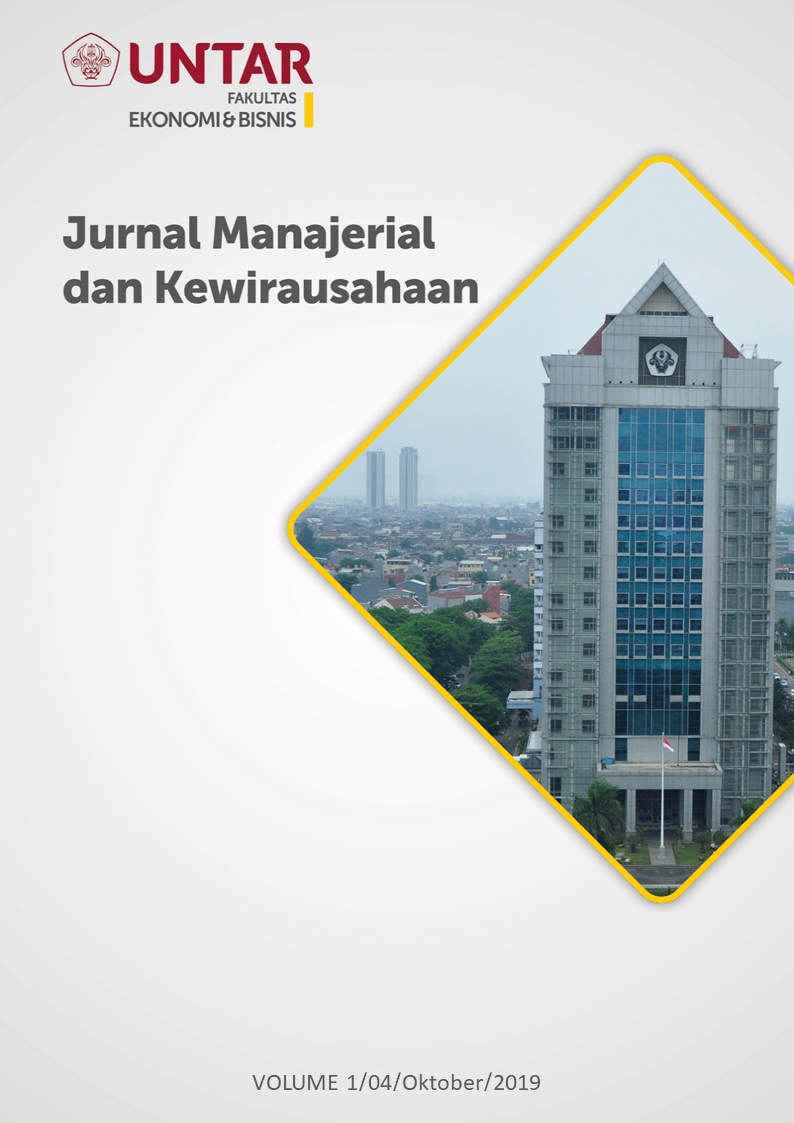Pengaruh Financial Knowledge, Locus of Control dan Financial Self Efficacy Terhadap Financial Behavior
Main Article Content
Abstract
This study discusses Financial Knowledge, Locus of Control and Financial Self-Efficacy variables related to Financial Behavior. In this study, the research design used was descriptive research design. Regarding the population in this study were all members of Kepolisian Daerah Metropolitan Jakarta Raya. The sample selection technique in this study was convenience sampling. The sample used in this study was a member of Kepolisian Daerah Metropolitan Jakarta Raya. The samples used in this study are 193 respondents in total that was collected using non-probability method. This study uses SmartPLS software version 3.2.8. Based on the results of hypothesis research, where the results of the Financial Knowledge variable have no influence, the Locus of Control variable has an influence and the Financial Self Efficacy variable has an influence on Financial Behavior in members of the Kepolisian Daerah Metropolitan Jakarta Raya.
Penelitian ini bertujuan untuk mengetahui apakah variabel Financial Knowledge (Pengetahuan Keuangan), Locus of Control (Lokus Kendali) dan Financial Self Efficacy (Efikasi Diri Finansial) berpengaruh terhadap Financial Behavior. Dalam penelitian ini, desain penelitian yang digunakan adalah desain penelitian deskriptif. Adapun populasi dalam penelitian ini yaitu seluruh anggota Kepolisian Daerah Metropolitan Jakarta Raya. Teknik pemilihan sampel dalam penelitian ini adalah convenience sampling. Sampel yang digunakan dalam penelitian ini yaitu anggota Kepolisian Daerah Metropolitan Jakarta Raya. Jumlah anggota kepolisian yang dijadikan sebagai sampel dalam penelitian ini sebanyak 193 responden dengan menggunakan metode non probability. Penelitian ini menggunakan software SmartPLS versi 3.2.8. Berdasarkan hasil pengujian hipotesis penelitian, dimana hasil variabel Financial Knowledge tidak memiliki pengaruh, variabel Locus of Control memiliki pengaruh dan variabel Financial Self Efficacy memiliki pengaruh terhadap Financial Behavior pada anggota Kepolisian Daerah Metropolitan Jakarta Raya.
Article Details
Section
This work is licensed under a Jurnal Muara Ilmu Ekonomi dan Bisnis Creative Commons Attribution-ShareAlike 4.0 International License.,/p>
References
Anandya, D., & Suprihhadi, H. (2005). Riset Pemasaran Prospektif dan Terapan. Edisi Pertama.
Cetakan Pertama. Malang: Bayumedia Publishing.
Arifin, A. Z. (2017). The influence of Financial Knowledge, Control and Income on individual
Finanical Behavior. European Research Studies Journal, Xx(3a),635-648.
Bandura, A. (1994). Self-efficacy. In V.S. Ramachaudran (Ed.), Encyclopedia of Human
Behaviour, 4 (pp. 71–81). New York: Academic Press.
Farrell, L., Fry, T. R. L., & Risse L. (2016). The Significance of Financial SelfEfficacy in
Explaing Women’s Personal Finance Behaviour. Journal of Economic Psychology 54,
-99.
Fornell, C., & Larcker, D. F. (1981). Structural equation models with unobservable variables and
measurement error: Algebra and statistics.
Geladi, P., & Kowalski, B. R. (1986). Partial least-squares regression: a tutorial. Analytica
chimica acta, 185, 1-17.
Grable, J. E., Park, J. Y., & Joo, S. H. (2009). Explaining financial management behavior for
Koreans living in the United States. Journal of ConsumerAffairs, 43(1), 80-107.
Hilgert, M. A., Hogarth, J. M., & Beverly, S. G. (2003). Household Financial Management: The
Connection Between Knowledge And Behavior. Federal Reserve Bulletin, 89, 309.
Herdjiono,I., & Damanik,L.A. (2016). Pengaruh Financial Attitude, Financial Knowledge,
Parental Income terhadap Financial Management Behavior. Jurnal Manajemen Teori dan
Terapan, 226-241.
Ida, & Dwinta, C. Y. (2010). Pengaruh Locus of Control, Financial Knowledge, Income
Terhadap Financial Management Behavior. Jurnal Bisnis dan Akuntansi.
Lusardi, A., & Mitchell, O. S. (2007). Baby boomer retirement security: The roles of
planning, financial literacy, and housing wealth. Journal of monetary Economics,
(1), 205-224.
Marsh, B. A. (2006). Examining the personal finance attitudes, behaviors, and knowledge levels
of first-year and senior students at Baptist universities in the state of Texas (Doctoral
dissertation, Bowling Green State University).
Mien,N. T., & Thao, T. P. (2015). Factors Affecting Personal Financial Management Behavior:
Evidence From Vietnam. Proceedings Of The Second Asia-Pacific Conference On Global
Business, Economics, Finance And Social Sciences (Ap15vietnam Conference) , (Pp. 1-16).
Nababan, D., & Sadalia, I. (2012). Analisis Personal Financial Literacy dan
Financial Behaviour Mahasiswa S-1 Fakultas Ekonomi Universitas
Sumatera Utara.
Perry, V. G., & Morris, M. D. (2005). Who Is in Control? The Role Of Self Perception,
Knowledge, And Income In Explaining Consumer Financial Behavior.The Journal Of
Consumer Affairs, 39(2), 299-313.
Prihartono, M. R. D., & Asandimitra, N. (2018). Analysis Factors Influencing Financial
Management Behaviour. International Journal Of Academic Research In Business And
Social Sciences, 8(8).
Rizkiawati, N.L., & Asandimitra, N. (2018). Pengaru Demografi, Financial Knowledge,
Financial Attitude, Locus of Control, dan Financial Self Efficacy Terhadap Financial
Management Behavior Masyarakat Surabaya. Jurnal Ilmu Manajemen, Volume 6 Nomor 3.
Robbins, Stephen P., and Timothy A. Judge. "Perilaku Organisasi Edisi 12 Buku 1 dan
" Jakarta: Penerbit Salemba Empat (2008).

